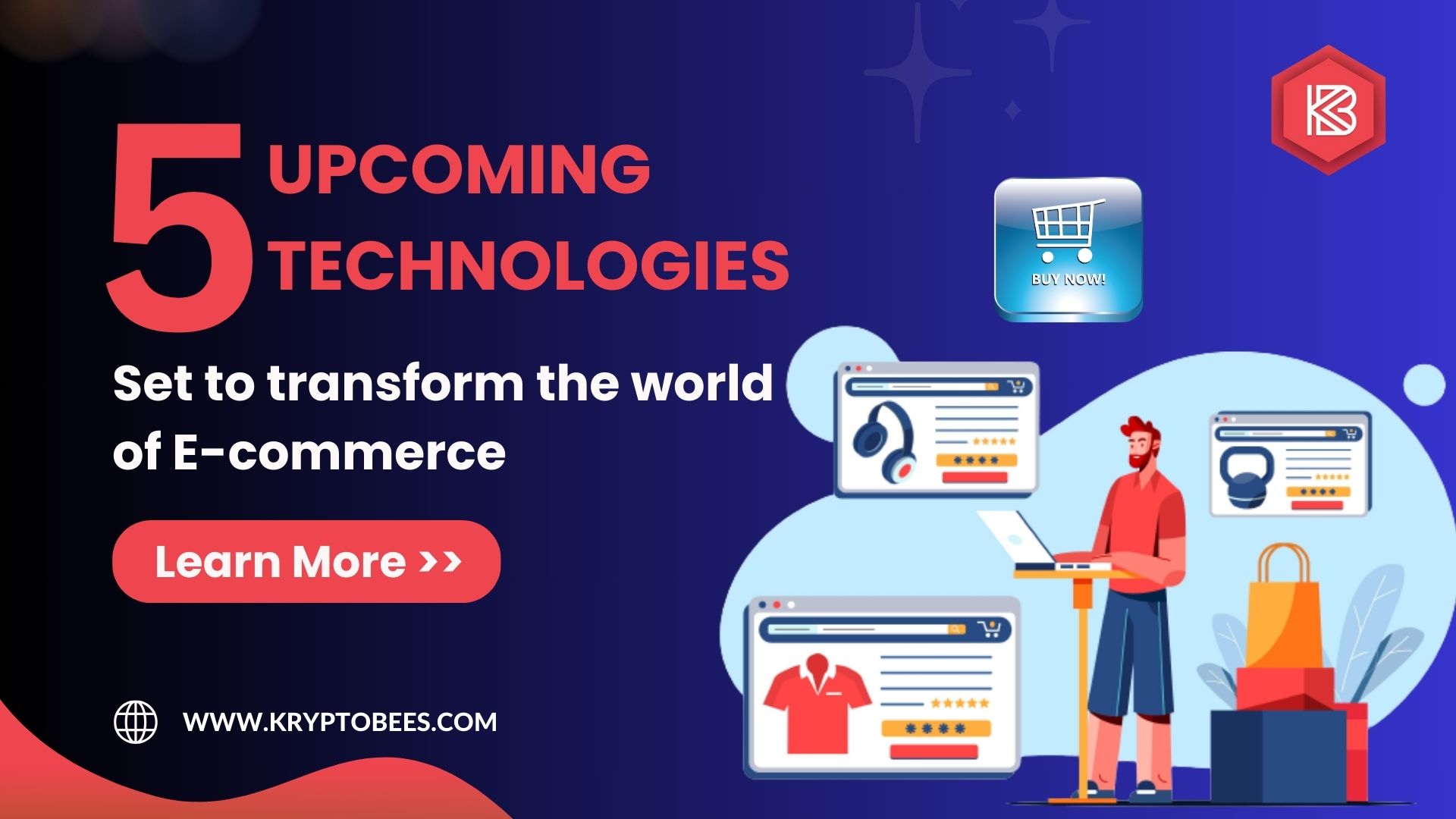Five Upcoming Technologies Set to Transform the World of eCommerce

The e-commerce sector has spearheaded a technological revolution an e-commerce trends, fundamentally altering how consumers shop and businesses operate in the future of e-commerce industry. Recent years have witnessed substantial transformations in retail and e-commerce, thanks to the IoT development, mobile devices, and social media. These changes have empowered consumers with greater access to information. E-commerce future trends strategies and operations have evolved to meet shifting customer demands, ultimately leaving an indelible mark on the global landscape. Mobile devices, social media, and cloud computing have made e-commerce industry trends both more intricate and more inclusive, catering to businesses of all scales.
We analyzed the tech landscape’s impact on e-commerce and retail processes to gauge how technology trends will shape online shopping in 2024. Below, we highlight technologies set to positively influence e-commerce. Currently, the trillion-dollar e-commerce industry thrives, propelled by remarkable advancements in business technology, including the widespread adoption of e-commerce thanks to innovations like e-commerce software and the ubiquity of smartphones.
E-commerce in today’s world
E-commerce future trends constitutes a transactional system where parties engage in the exchange of goods, services, and information through the digital network, primarily the Internet. It plays a pivotal role in handling the sales component of e-business. In line with evolving commercial profiles, six distinct forms of electronic commerce are recognized. This encompasses Business-to-Consumer (B2C) activities and aligns with current e-commerce trends and future industry developments. The ever-changing landscape of e-commerce introduces various e-commerce future trends that promise to shape the future of e-commerce industry.
- Business-to-Business
- Consumer-to-Consumer
- Consumer-to-Business
- Business-to-Administration
- Consumer-to-Administration
Electronic commerce, at its core, relies on software development technologies encompassing mobile commerce, online transaction processing, electronic data interchange (EDI), inventory and supply management systems, automated data collection systems, and digital marketing. It’s complemented by technologies for mobile devices, social media, and email tools. Software development firms like MLSDev offer a diverse range of services for creating innovative e-commerce software. Pioneers like Amazon and eBay paved the way for e-commerce, which, as of 2021, is poised to engage 2.14 billion digital buyers. Despite current e-commerce vs brick-and-mortar statistics favoring traditional retail, the e-commerce industry’s annual growth (11.9% in 2018) indicates a future where online purchases dominate.
Some of the upcoming e-commerce trends are making a promising future for the e-commerce industry where most entrepreneurs and investors are going to invest.
Emerging Technologies Poised to Revolutionize the Future of the E-commerce Sector
Adopt Blockchain Technology
E-commerce future trends are undergoing a transformative phase through the groundbreaking integration with blockchain development. As the e-commerce landscape evolves, it presents various challenges, including issues concerning trust, slow transaction speeds, increased fees, and complex digital data ownership policies. Blockchain development and web3 development, with its decentralized and verifiable digital transaction ledger, emerges as a solution to instill trust in online payments, effectively curbing fraudulent activities while introducing innovative payment methods through cryptocurrencies such as Bitcoin, Ethereum, and Ripple.
A tangible illustration of these challenges can be found in Amazon’s policies governing its network of retailers. These policies restrict direct interactions between retailers and customers, permitting only a single follow-up email. Moreover, Amazon maintains its own customer support, which often lacks familiarity with the products offered by the retailers, potentially eroding the credibility of these sellers and raising costs for customers.
Currently, experts are actively developing the E-Commerce marketplace, which promises to shape the future of online retail. E-Commerce leverages blockchain technology to address past shortcomings, resulting in faster, cost-efficient transactions, data immutability, and heightened security. These amenities cabe accomplished with the help of blockchain development company.
Implement Chatbot Systems
A chatbot, also called a conversational agent, is a chatbot development software engineered to replicate human interaction, both in written and spoken forms. These adaptable bots take on various forms, such as website chatbots, chatbot apps, social media chatbots, and voice assistants.
The real value of embracing this chatbot development technology lies in its capacity to optimize operations and reduce expenses through continuous, automated customer support in the e-commerce trends. Furthermore, chatbot development services excel in generating leads, directly bolstering revenue by gathering initial client information and effectively steering potential customers towards pertinent information.
An example of a chatbot development services for customers is Hipmunk, a travel search engine employing chatbots to address travel-related queries and provide recommendations on its website. Conversely, office supply retailer Staples employs a chatbot to suggest products based on a customer’s purchase history and even facilitates direct transactions via chat. Nevertheless, with each passing year, e-commerce chatbots grow increasingly sophisticated, communicating more naturally. For enterprises looking to harness these capabilities, it is imperative to explore and invest in chatbot development and chatbot development services.
Integration of Artificial Intelligence and Machine Learning
Artificial Intelligence (AI) and Machine Learning (ML) are transforming e-commerce through cutting-edge technology and automation. artificial intelligence development involves developing computer systems to execute tasks that typically require human intelligence. It encompasses crafting algorithms and models that empower machines to learn, reason, and make decisions akin to humans.
On the other hand, ML, a subset of AI, concentrates on enabling systems to learn and improve from data without explicit programming. AI in e-commerce and ML reshape the customer journey. This includes AI-driven chatbots and Intelligent Virtual Assistants (IVAs) for instant customer support, personalization of product recommendations, marketing campaigns, customized experiences, optimization of the supply chain, dynamic pricing, and real-time price adjustments. Furthermore, they excel in fraud detection and prevention by analyzing transactional data patterns.
AI development in e-commerce bolsters these advancements, enhancing the industry’s efficiency and customer satisfaction. It’s a pivotal force driving progress in the e-commerce sector. Businesses can reap the benefits of AI in e-commerce through Artificial Intelligence development services to implement these innovations and stay competitive.
Augmented Reality and Virtual Reality Shopping
Virtual Reality (VR) and Augmented Reality (AR) share similar technology, yet their distinctions are often muddled. VR creates an entirely artificial reality, while AR introduces virtual elements into the real world. Incorporating VR and AR into e-commerce has the potential to reshape the future of online shopping. Picture virtually interacting with and examining products before buying them – trying on clothing, feeling fabrics, and visualizing how they fit. Some e-stores like Banana Flame already employ AR, enabling shopping with VR consumers to use webcams as interactive mirrors.
Fashion is not the sole beneficiary; industries like beauty, furniture, and automotive leverage AR for visualizing mobile purchases. Companies such as Ikea and Audi use augmented reality glasses, allowing users to design kitchens and explore cars. Major players like Google, Apple, and Facebook have invested heavily in AR, with Alibaba, Microsoft, and HTC developing their AR technology. The VR and AR market, valued at $108 billion, is increasingly dominated by AR, driven by its prevalence on mobile devices. Integrating Virtual Reality into e-commerce and shopping with VR holds tremendous potential.
Allocate Resources to the Internet of Things
The Internet of Things (IoT) is ushering in a new e-commerce era, with connected devices like sensors and cameras offering real-time insights into customer preferences and behavior. This data not only enhances market understanding but also streamlines inventory management, order fulfillment, and customer service. Despite its youth, IoT in e-commerce maximizes customer engagement and efficiency.
IoT applications in e-commerce include: Smart Logistics and Inventory Management IoT sensors monitor inventory, track goods in real-time, and optimize shipping routes, reducing shipping times and costs. Personalized Shopping Experiences IoT devices collect customer data to offer tailored recommendations, targeted advertising, and promotions, such as smart mirrors suggesting outfits based on size and style.
Automated Customer Service IoT-powered chatbots provide 24/7 personalized support, saving costs and enhancing customer satisfaction. Connected Devices IoT-enabled devices like smartwatches and home assistants enable seamless shopping and shipment tracking, enhancing the customer experience. Predictive Analytics IoT data aids in formulating marketing strategies, product development, and customer retention through trend identification and customer behavior analysis.
IoT development and IoT app development play pivotal roles in creating efficient, intelligent supply chains and elevating the e-commerce shopping experience.
Embrace E-commerce Technology Trends Through Kryptobees
E-commerce has evolved significantly with new technologies and shifting consumer behavior, promising ongoing changes. These trends are reshaping the future of e-commerce, offering businesses innovative ways to reach customers and enhancing convenience. Staying updated is crucial. Kryptobees, a comprehensive agency, integrates creativity, technology, and strategy to provide exceptional e-commerce solutions. Our in-house team comprises top-notch web designers, developers, branding and marketing experts, copywriters, and more.
Our core focus is on delivering value through tailor-made e-commerce solutions that ensure seamless user experiences and boost conversion rates. We merge cutting-edge design, advanced e-commerce technology, and data-driven approaches to assist businesses in achieving their e-commerce objectives. Our dedicated team invests time in comprehending your brand identity, target audience, and business goals, guaranteeing that every facet of your online store aligns with your unique brand identity and resonates with your target e-commerce industry trends market.
If you’re ready to incorporate the latest e-commerce trends into your online store, don’t hesitate to arrange a consultation with our team. We’re here to help you stay ahead in the e-commerce industry trends and establish the future of e-commerce industry.
 Discuss Project!
Discuss Project!
